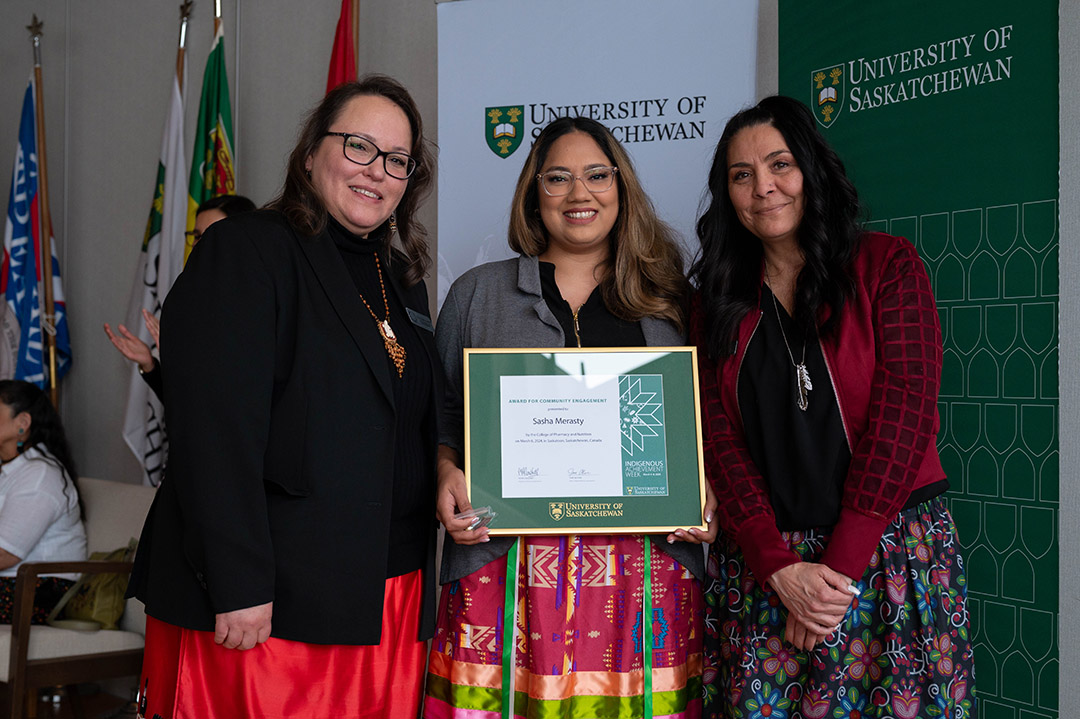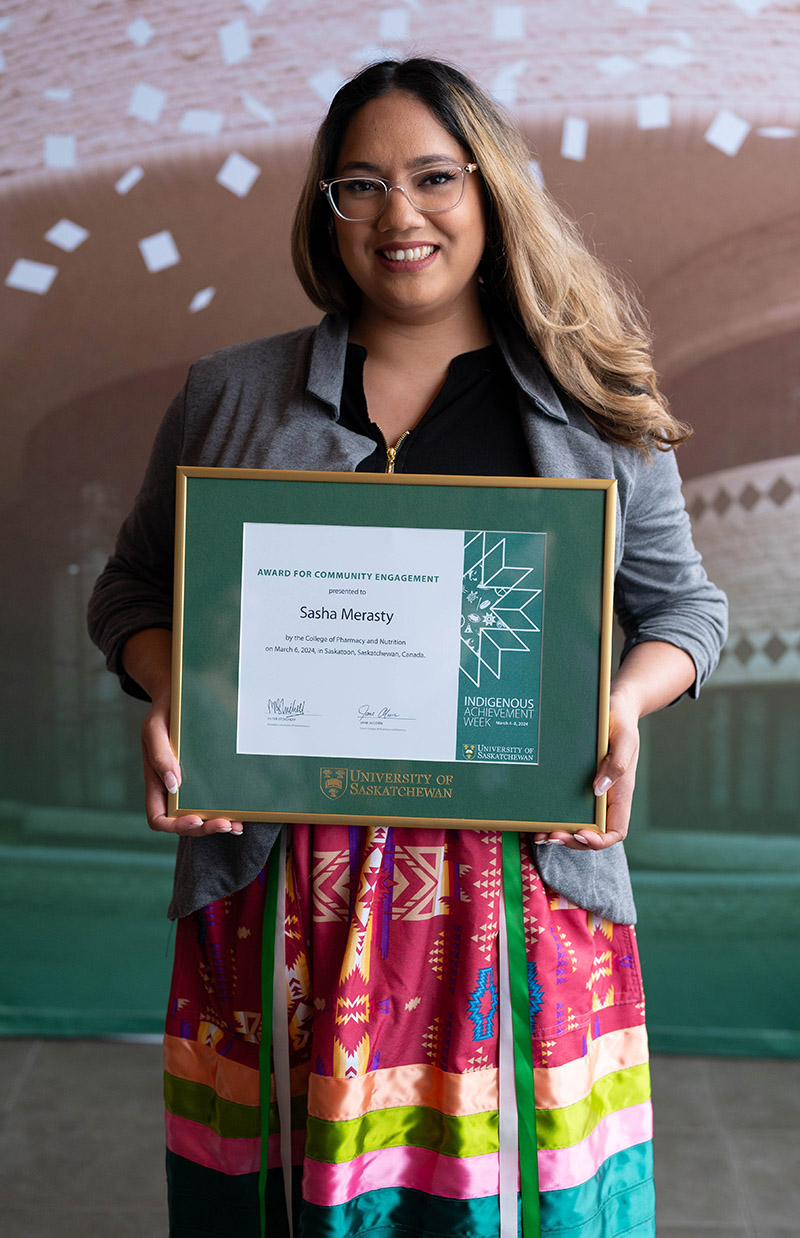
USask pharmacy student working to make health care equitable
Sasha Merasty says listening is the key to direct energies in the right direction.
By John ShellingMerasty has been working hard to ensure her goal to inspire others to reflect on the health care needs of Indigenous populations in Canada is heard.
The fourth-year PharmD student at the University of Saskatchewan (USask) is a founding member of Indigenous Pharmacy Professionals of Canada (IPPC), which promotes pharmacy practices that respect the safety, equality, strengths, and teachings of First Nations peoples and created the first national pharmacy scholarship in Canada designated for Indigenous students.
For her efforts in community engagement Merasty received an award at this year’s Indigenous Student Achievement Awards (ISAA), which took place on March 6. Indigenous students from across the university were honoured at a ceremony to recognize their academic excellence, community engagement, leadership, research endeavours or resiliency.
The ISAA is part of Indigenous Achievement Week (IAW) which celebrates the successes and contributions of Métis, First Nations and Inuit students, staff and faculty at USask.
We asked Merasty a few questions about her time at USask and what motivates her.
Why did you choose pharmacy as your profession?
When I was young, I had positive experiences with pharmacists while a relative was sick in the hospital. I wanted to help my relative however I could, and a pharmacist took the time to explain their care plan to me so that I could better participate in their care. I admired the pharmacist who helped me, and as I grew older, I found the profession aligned with my goal of wanting to help people take a more active role in their own health care. When I went into university, I learned how underrepresented Indigenous people are in the pharmacy profession, and I decided that I wanted to advocate for Indigenous equity and equality in the Canadian health-care system.
What challenges do you see in pharmacy that you hope will be eliminated over your career?
In general, I hope to increase the representation of Indigenous peoples in the pharmacy profession and to improve equity and equality in the Canadian health-care system. More specifically, I want to work with my community, the Peter Ballantyne Cree Nation, to provide health care informational sessions that target common Indigenous health care concerns. I hope to improve health care access in Northern Saskatchewan by opening a pharmacy of my own in a northern Indigenous community and doing satellite pharmacy days in other northern communities that provide diabetes education and help Indigenous people understand and use the NIHB health-care system. I also want to promote trauma-informed health care and unbiased, patient-centred care so that Indigenous perspectives and traditional health care treatments gain wider acknowledgement and acceptance in the Canadian health-care system.

Is there someone in your life who inspired you to get where you are today?
My personal experiences with family members who were in and out of the hospital during my childhood inspired me to understand diseases and their treatments because I wanted to be helpful to my family. Now, I want to be a person who can explain health care treatments and options for other people. Ensuring positive experiences with the health-care system means providing informed health care that is evidence-based and patient-centred, and I want to help patients be proactive in their health care so they get a treatment plan they are comfortable with and want to follow. My upbringing shaped who I am today, and although I faced challenges and had to be resilient, these experiences allowed me to empathize with and relate to patients.
If you were to give a first-year undergraduate student advice about attending post-secondary school, what would you tell them?
You are capable of much more than you think, so put yourself out there and get connected on campus. There are many groups and opportunities on campus, and it is important to network and get involved on the campus to make the most of your post-secondary education. In my first year, I signed up for as many things as I could, and those activities created many positive relationships and opened my eyes to the many opportunities on campus. Getting connected with an academic advisor and career services is also important: advisors can help you navigate the university more efficiently and effectively, and my advisors have helped me in many ways.
You are receiving the award for community engagement, why is community important to you?
Community is important to me because no one should feel isolated. Inclusive community engagement is an important factor in the growth and success of communities. A sense of cultural identity, belonging, and safety starts with your community, and I began empowering my community by volunteering from a young age. I find volunteering personally rewarding, but my goal has always been to effect positive change and hopefully improve someone else’s life as many people from my community have improved mine in the past. Everyone’s voice matters, and I want to ensure that all the voices in my community are heard because active participation from marginalized groups is integral to change. In order to create positive change, we must first listen to the concerns of people so that we can focus our energies in the right direction.
Is there anything else you would like to share?
There is no success without failure, so I want to remind people to keep going and not give up on their goals. Make short-term and long-term goals, and constantly remind yourself of them to motivate yourself towards the future you want to achieve. Reinforce positive self-talk, because you can achieve anything you put your mind to.
Together, we will work towards Truth and Reconciliation. We invite you to join by supporting Indigenous achievement at USask.
Article re-posted on .
View original article.

